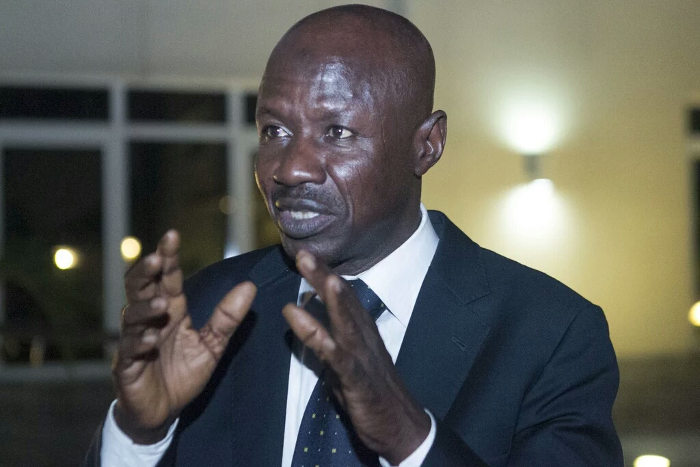 |
| Ibrahim Magu, Acting EFCC Chairman of EFCC |
The Economic and Financial Crimes Commission (EFCC) on Thursday solicited the support of trade unions and Civil Society Organisations (CSOs) to facilitate mass education against corruption.
The South-East Zonal Head of the commission, Mr Usman Imam, solicited the support at the 3rd African Anti-corruption Day celebration in Enugu.
Imam said that the effect of corruption had become hydra headed that CSOs, professional bodies, trade unions and others were needed to be fully involved in the fight against it.
He said that the EFCC was committed to winning the corruption war no matter how long it took, adding that to do that “Nigerians needed to join in the fight.
“Until Nigerians are determined to expose and hold public officials accountable for their stewardship and not see the fight from ethnic, political or religious perspectives, the war might never be won,” he said.
The EFCC zonal head said that the Federal Government had particularly made the fight against corruption and the recovery of stolen assets a key agenda for the current administration.
“This has translated to significant recoveries of public funds,” he said.
He said that the African anti-corruption day had its roots on series of events leading to an African Union Convention on Prevention and Combating Corruption adopted in Maputo, Mozambique on July 11, 2003.
“In cognizance of this, the African Union adopted July 11 as the African Anti-corruption Day and this year will mark the 3rd edition of the event,” he said.
Imam said that the objective of the event was to bring together all relevant anti-corruption stakeholders to reflect on the challenges of asset recovery in Africa.
He said that the event would be used to also solicit contributions and support toward a framework for an African Common Position on Asset Recovery.
“According to the High Level Panel on Illicit Financial Flows (IFF), the continent is losing in excess of 50 billion US Dollars annually through illicit financial outflows.
“A large portion of these outflows is made up of illegally acquired assets that are located all over the world.
“In Nigeria, just as every other African countries marking the occasion, we have been served with a very high dosage of the poison called corruption,” he said.
Imam said that Nigeria had one of the most far-reaching and deeply entrenched culture of corruption in the African continent.
“This is manifested in the increasing large number of corruption related investigations, litigations, convictions and recoveries made by the EFCC,” Imam added.
The News Agency of Nigeria (NAN) reports that the event which had in attendance, officers of relevant government agencies, featured a road march around Enugu metropolis. (NAN)
The South-East Zonal Head of the commission, Mr Usman Imam, solicited the support at the 3rd African Anti-corruption Day celebration in Enugu.
Imam said that the effect of corruption had become hydra headed that CSOs, professional bodies, trade unions and others were needed to be fully involved in the fight against it.
He said that the EFCC was committed to winning the corruption war no matter how long it took, adding that to do that “Nigerians needed to join in the fight.
“Until Nigerians are determined to expose and hold public officials accountable for their stewardship and not see the fight from ethnic, political or religious perspectives, the war might never be won,” he said.
The EFCC zonal head said that the Federal Government had particularly made the fight against corruption and the recovery of stolen assets a key agenda for the current administration.
“This has translated to significant recoveries of public funds,” he said.
He said that the African anti-corruption day had its roots on series of events leading to an African Union Convention on Prevention and Combating Corruption adopted in Maputo, Mozambique on July 11, 2003.
“In cognizance of this, the African Union adopted July 11 as the African Anti-corruption Day and this year will mark the 3rd edition of the event,” he said.
Imam said that the objective of the event was to bring together all relevant anti-corruption stakeholders to reflect on the challenges of asset recovery in Africa.
He said that the event would be used to also solicit contributions and support toward a framework for an African Common Position on Asset Recovery.
“According to the High Level Panel on Illicit Financial Flows (IFF), the continent is losing in excess of 50 billion US Dollars annually through illicit financial outflows.
“A large portion of these outflows is made up of illegally acquired assets that are located all over the world.
“In Nigeria, just as every other African countries marking the occasion, we have been served with a very high dosage of the poison called corruption,” he said.
Imam said that Nigeria had one of the most far-reaching and deeply entrenched culture of corruption in the African continent.
“This is manifested in the increasing large number of corruption related investigations, litigations, convictions and recoveries made by the EFCC,” Imam added.
The News Agency of Nigeria (NAN) reports that the event which had in attendance, officers of relevant government agencies, featured a road march around Enugu metropolis. (NAN)
In this article:
